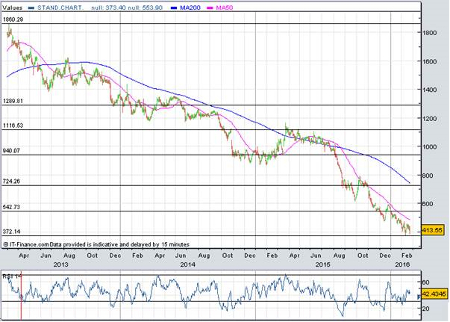Standard Chartered near 21st Century low
23rd February 2016 13:01
by Lee Wild from interactive investor
Share on
"We are under no illusions that a lot more needs to be done," said chairman Tuesday. Due to step down this year, Sir John Peace signs off with a shock $1.5 billion (£1.1 billion) annual loss, no dividend for shareholders, and no bonuses for top brass.
New chief executive Bill Winters has got a £3.3 billion rights issue away and kickstarted a huge, and expensive, restructuring of the Far East-focused bank. But it will take time to deliver meaningful results, something shareholders clearly do not have. It explains why Standard shares have plunged as much as 12% to within a stone's throw of a new 18-year low.
The 2015 results missed on many key levels. Operating income fell 15% to $15.4 billion and a reported pre-tax profit of $4.2 billion in 2014 turned to a $1.5 billion loss this time. Analysts thought Standard would make $602 million. Loan impairments almost doubled to $4 billion.
Strip out another slug of one-offs, including a $1.8 billion restructuring bill for redundancies and write-downs, plus $362 million goodwill impairment, and underlying pre-tax profit plunged by 84% to just $834 million.

A 12.6% Common Equity Tier 1 ratio - a core measure of financial strength - was also about 30 basis points shy of some estimates, although Standard still expects it to be near the top end of the 12-13% target range. A $20 billion portfolio of risk-weighted assets will be "assertively managed out", which will certainly help.
Standard laid the blame for the income slump evenly between a strong dollar, asset sales, lower commodity prices, and a dip in business activity generally. And Peace had a warning for shareholders:
"There remains a broad range of macroeconomic uncertainties and challenges in the global economy, including the rebalancing of China's economy, the impact of lower commodity prices, and ongoing geo-political tensions."
But the lender has delivered annualised cost efficiencies of $0.6 billion, and begun a programme to save $2.3 billion over the next three years.
Investec Securities said recently that, on 0.5 times 2015-17 tangible net asset value, Standard Chartered remains "optically cheap". However, return on tangible equity forecasts of 0% in 2015, 0% in 2016 and 4% in 2017 "offer context".
Until there's an obvious uptick in business activity and further restructuring benefits come through, Standard Chartered shares will remain a dangerous place for investors.
This article is for information and discussion purposes only and does not form a recommendation to invest or otherwise. The value of an investment may fall. The investments referred to in this article may not be suitable for all investors, and if in doubt, an investor should seek advice from a qualified investment adviser.